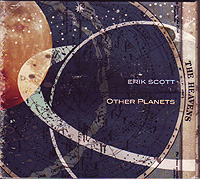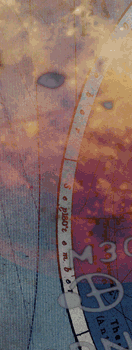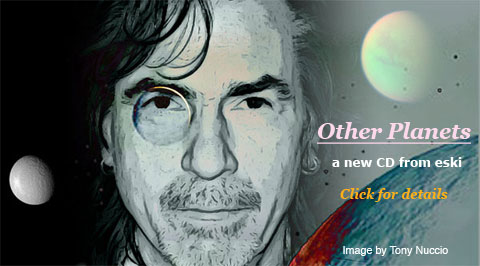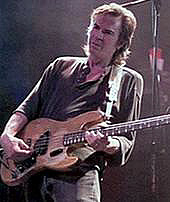 New
Age music was huge in the 1980s, spurred on by the advent of the CD
and the amazing new dynamic created by the incredible advances the
digital medium brought to the music world. One artist carrying on
that great New Age rock style is bass player Erik Scott, who released
Other Planets in 2011. Erik Scott’s style of New Age /
rock fusion tastefully combines jazz and even some World Beat etchings
but there’s no doubt Other Planets is a cosmic masterpiece
of meditative instrumental music, perfect for late night sojourns
or early morning meditations. Some prominent music critics have described
Other Planets as being more Pink Floyd than Jaco Pastorius.
Of course, both Jaco’s work in Weather Report and Pink Floyd’s
cosmic rock extrapolations may be world’s apart style wise, but
Erik Scott joins them at the hip on his latest instrumental masterpiece.
Scott goes by the name Eski in the packaging and—performing all
the bass work, generated sound FX, keyboards and drum programming—he’s
joined by some fine players who help him seamlessly combine a number
of instrumental music art forms into one appealing album. Other
Planets gets extra credits for the superb sound and eye-catching
packaging. Well worth the time for space cadets and jazzers with an
ear out for the wilder, more cosmic sound of fusion legends like Weather
Report. Erik Scott is living out a most impressive career in the music
world and you can read about it on his web site. www.ErikScottBass.com
/ www.myspace.com/erikscottbass
New
Age music was huge in the 1980s, spurred on by the advent of the CD
and the amazing new dynamic created by the incredible advances the
digital medium brought to the music world. One artist carrying on
that great New Age rock style is bass player Erik Scott, who released
Other Planets in 2011. Erik Scott’s style of New Age /
rock fusion tastefully combines jazz and even some World Beat etchings
but there’s no doubt Other Planets is a cosmic masterpiece
of meditative instrumental music, perfect for late night sojourns
or early morning meditations. Some prominent music critics have described
Other Planets as being more Pink Floyd than Jaco Pastorius.
Of course, both Jaco’s work in Weather Report and Pink Floyd’s
cosmic rock extrapolations may be world’s apart style wise, but
Erik Scott joins them at the hip on his latest instrumental masterpiece.
Scott goes by the name Eski in the packaging and—performing all
the bass work, generated sound FX, keyboards and drum programming—he’s
joined by some fine players who help him seamlessly combine a number
of instrumental music art forms into one appealing album. Other
Planets gets extra credits for the superb sound and eye-catching
packaging. Well worth the time for space cadets and jazzers with an
ear out for the wilder, more cosmic sound of fusion legends like Weather
Report. Erik Scott is living out a most impressive career in the music
world and you can read about it on his web site. www.ErikScottBass.com
/ www.myspace.com/erikscottbass
mwe3.com presents an interview with
Erik "Eski" Scott
 mwe3.com:
You have an extensive history in pop and rock, having worked in the
past with greats like Flo & Eddie, Alice Cooper and your band
Sonia Dada. How did you evolve moving from rock music into recording
one of the great New Age style rock instrumental albums of 2011, the
Other Planets CD?
mwe3.com:
You have an extensive history in pop and rock, having worked in the
past with greats like Flo & Eddie, Alice Cooper and your band
Sonia Dada. How did you evolve moving from rock music into recording
one of the great New Age style rock instrumental albums of 2011, the
Other Planets CD?
ES: Well first off, thanks much for the nice compliment concerning
the CD. As far as my evolving, after almost 40 years of recording
records with bands and touring to promote them, I just kind of stepped
off the bus for awhile. I really didn't think anything about what
genre this music was going to be. I just wanted it to be cool, and
maybe show what could be done with the electric bass, and not having
a band or singers around me, there were no rules. Having said that
though, it really wasn't about the bass, it was about making some
cool music...and since I was the only guy there, I grabbed the instruments
I knew.
Some compositions I started with a kind of a banjo type articulated
picking of the chord changes, like "Bartalk" and "Proper
Son", done on the bass with a chorale type effect, and then played
the melodic lead, again on the bass, frequently with effects normally
used on guitar leads. Then playing a vocal/string patch on the keyboards
gave me the idea to blend this warmer upper register bass sound with
steel guitar. I dug the warmth of this vibe a lot, and used steel
guitar on four of the tunes. I really had no idea I was making what
folks might call a New Age rock instrumental, or 'ambient' music.
After some time, I did realize that there was a chilled out moody
vibe to most of the music.
mwe3.com: What kind of sound were you going for on the Other Planets
CD? Someone said that your CD is more Pink Floyd than Jaco, yet among
the New Age cosmic sounds you can still hear a kind of jazzy Weather
Report kind of vibe.
ES: I just hoped to get a sound that had some of its own personality,
and I discovered that using the bass to play the melodies instead
of guitars, synths, or horns, did give it a different, warmer vibe.
I did use my synthesizer, but for ethereal pads and atmosphere, rather
than lead instruments. We're not trying to take over the world here,
(laughter) just playing the instrument that sits within reach. And
so the sound started to evolve. And as I was using an echo/delay/wah
sort of effect on the main melodies, an effect supplied by the Zoom
bass fx box, one thing led to another. And when I wanted some sonic
effects to enhance the otherworldliness of some of the tunes, I knew
I could get them by scraping bass strings, and making harmonics through
an effect. Then I tried adding some steel guitar by John Pirruccello,
and I dug that a lot. As far as Weather Report and Jaco, any resemblance
is accidental, cause I really don't play like them, or as well as
he could. There is fretless bass on the record, so that may ring some
bells.
 mwe3.com:
There's some great players on the Other Planets CD. How did
you assemble such a fine crew of musicians to work with? There's also
some fantastic and quite varied guitar playing on the album and I
was amazed by the steel guitar sounds too.
mwe3.com:
There's some great players on the Other Planets CD. How did
you assemble such a fine crew of musicians to work with? There's also
some fantastic and quite varied guitar playing on the album and I
was amazed by the steel guitar sounds too.
ES: I knew all of the guys from my days in Sonia Dada and around Chicago,
so when I wanted to add a color, I would call one of them. When I
got an arrangement I liked, I first got Hank Guaglianone to put real
drums on the track, as I initially write and record the tunes with
some sort of drum program. Then I would add at least one instrument
to take it somewhere further...Glen Rupp's acoustic guitar on "Donnie
& Sancho", Chris "Hambone" Cameron's piano on four
tracks, John's steel guitar on four tracks. But I think the varied
guitar sounds you refer to are mostly electric basses in the upper
register. There is electric guitar on only two tracks but you know
Robert, you are not the only person to assume those melodies are guitar.
mwe3.com: The CD cover art and packaging is brilliant too. What was
your concept as far as adding that visual element into the mix?
ES: The first composition I did for the record was "Other Planets
(Sundogs)", an expansion on an idea I did on a Sonia Dada record....and
I was headed that way from the beginning, without really knowing it
yet. Then as the material for the CD was taking shape, it became apparent
that artwork referencing astronomy and the other planets made sense,
and graphic designer Tony Nuccio made that happen. Plus, I don't know
if you've ever been asked what planet you come from, but I have.
 mwe3.com:
Can you say something about the Lakland basses you play on the Other
Planets album? Also can you add in something regarding some of
your other bass guitars and other guitars you have and play and compose
with?
mwe3.com:
Can you say something about the Lakland basses you play on the Other
Planets album? Also can you add in something regarding some of
your other bass guitars and other guitars you have and play and compose
with?
ES: I use my deconstructed '64 Fender Jazz for a lot of the melodies,
with fairly new Dean Markley strings. The newer strings catch the
FX better, and I use older strings for the more conventional range
rhythm parts. The Joe Osborne model Lakland is especially good for
rounder rhythmic tones. The Lakland Fretless has a distinctive mid-range
with a real personality. I also use a Pedulla Fretless "Buzz"
bass, it's in the intro of "Bartalk". The effects box I
used was the Zoom 708ll Bass FX box.
mwe3.com: When did you start playing bass and when did you start composing
and writing music and can you remember your first guitars?
ES: I started playing the bass when a buddy in high school said I
could play in his band at the next week's gig if I played the bass,
and so I did. I think I played the same bass part for all the songs,
just changed keys. I started writing about two years later, all thought
it was a bit limited form awhile. My first guitar was a Fender, then
Gibson, Eko, and back to Fender. I've had this '64 since 1968, using
it on the first album I did that year, Forever Is A Dream,
by the group Food, on Capital Records. (laughter).
mwe3.com: What were some of your first musical influences and/or guitar
and bass heroes?
ES: Well, I'm old school, and the first bass cats who consistently
caught my ear were James Jamerson of Motown, Paul McCartney of some
British band, and John Entwistle, of the Who. Later on, Pino Palladino
blew me away. Guitar guys like Mark Knopfler and Duane Eddy, and of
course Clapton always please the ear bones. Likewise, the first music
I heard was Elvis Presley, the Motown groups, the British Invasion,
and the Beach Boys. But those were only the first influences, I hear
folks all the time who kill me with their ideas, and they are a diverse
bunch: Ennio Morricone, Evanescence, many others.
mwe3.com: How did you balance the bass guitar sound on the Other
Planets CD with your performance on keyboards and special effects?
 ES: The
main thing to take into account when featuring the bass as the lead
melodic voice is to make sure there is not too much low end frequency
on it. Often when somebody says "there's too much bass",
what they really mean is there is too much low end frequency. So I
rolled off low frequency on the featured melodic parts. When the bass
is being used in a more conventional manner as the rhythm and low
end of the sonic spectrum, it's a whole different ball game. At those
times, it's more a supportive role married to the drums, and usually
no effects. On Other Planets I had to make sure the keyboard
parts accomplished their mission of mood and chordal support, with
melodic overtones, without masking other sounds. Keyboard pads can
be thick with low end frequency as well. Given the warm nature of
the instruments on "Other Planets", I had to make sure that
low frequencies didn't pile up and get out of hand. In much of the
music on Other Planets, the 'special effects' function like
another instrument. I tried to make sure the sounds fit the composition
and were heard at the right times, in the right places. Since in this
case these "instruments" were often echoed sounds, sometimes
panned across the sonic spectrum, I had to make sure the delays were
in rhythm, or appropriately cross-rhythm, and that the tones created
were also appropriate, and furthered the arc of the music. And lastly,
I needed to make sure I didn't overuse them.
ES: The
main thing to take into account when featuring the bass as the lead
melodic voice is to make sure there is not too much low end frequency
on it. Often when somebody says "there's too much bass",
what they really mean is there is too much low end frequency. So I
rolled off low frequency on the featured melodic parts. When the bass
is being used in a more conventional manner as the rhythm and low
end of the sonic spectrum, it's a whole different ball game. At those
times, it's more a supportive role married to the drums, and usually
no effects. On Other Planets I had to make sure the keyboard
parts accomplished their mission of mood and chordal support, with
melodic overtones, without masking other sounds. Keyboard pads can
be thick with low end frequency as well. Given the warm nature of
the instruments on "Other Planets", I had to make sure that
low frequencies didn't pile up and get out of hand. In much of the
music on Other Planets, the 'special effects' function like
another instrument. I tried to make sure the sounds fit the composition
and were heard at the right times, in the right places. Since in this
case these "instruments" were often echoed sounds, sometimes
panned across the sonic spectrum, I had to make sure the delays were
in rhythm, or appropriately cross-rhythm, and that the tones created
were also appropriate, and furthered the arc of the music. And lastly,
I needed to make sure I didn't overuse them.
mwe3.com: What are you hoping listeners will come away with after
hearing the Other Planets album, and can you let us know some
of your other upcoming plans for 2011 and beyond?
ES: Quite simply, I hope people just dig listening to the music. I
know a record like this isn't what you play at the party, or the ball
game, but it can be cool after the party, maybe in the car. There
is always a time to chill out, right? Stare off into space? (laughter)....Gotta
mellow out sometime. I'm not trying to conquer the world or anything
at the moment. My plans are just to keep trying to make some cool
music, and enjoy some life along the way.
Thanks to Erik Scott @ www.ErikScottBass.com



